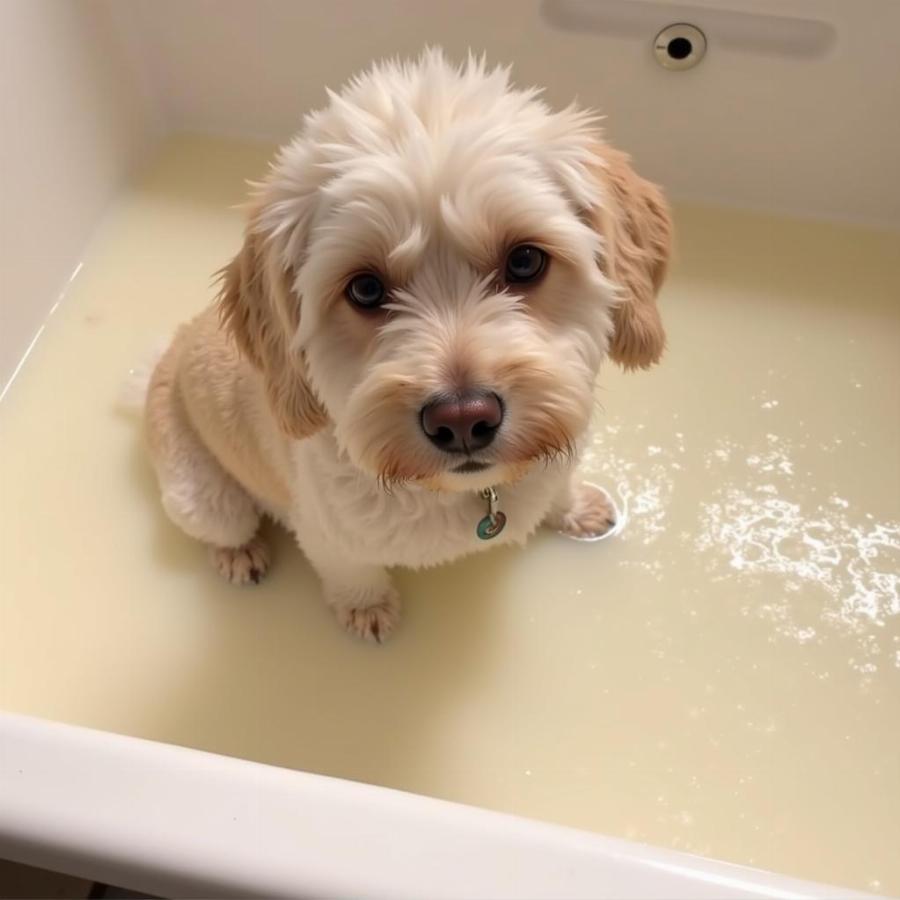Your furry friend is scratching incessantly, but a thorough flea check reveals nothing. This frustrating scenario is all too common for dog owners. “Dog constantly scratching but no fleas” signifies a deeper issue that requires investigation. Let’s delve into the potential causes and solutions to help your itchy companion find relief.
Beyond Fleas: Why is My Dog Itching?
Fleas are often the first suspect when a dog scratches, but the absence of these pesky critters points to other potential culprits. Allergies, environmental irritants, dry skin, and even underlying medical conditions can cause persistent itching. Identifying the root cause is crucial for effective treatment.
Allergies: A Common Culprit
Just like humans, dogs can suffer from allergies. These allergies can manifest as skin irritation, leading to constant scratching. Common allergens include pollen, dust mites, mold, and certain foods. If your dog is constantly scratching, especially during specific seasons or after eating certain foods, allergies might be the culprit.
Environmental Irritants: Hidden Itch Triggers
Everyday household items can irritate your dog’s sensitive skin. Soaps, detergents, cleaning products, and even certain fabrics can trigger itching. Consider switching to hypoallergenic products and thoroughly rinsing bedding and toys to minimize exposure.
Pinpointing the Problem: Diagnostic Steps
Diagnosing the cause of your dog’s itching often involves a process of elimination. Keeping a detailed log of your dog’s scratching episodes, including when they occur, where they scratch, and any other accompanying symptoms, can be invaluable for your veterinarian.
Veterinary Examination: Expert Guidance
A visit to the veterinarian is essential for a proper diagnosis. Your veterinarian can perform skin tests, allergy tests, and other diagnostic procedures to identify the underlying cause of the itching. They can also rule out any underlying medical conditions.
Food Trials: Identifying Dietary Sensitivities
Food allergies can be tricky to diagnose. Your veterinarian may recommend a food trial, where your dog is fed a hypoallergenic diet for a period of time to see if the itching subsides. This can help pinpoint any food sensitivities that might be contributing to the problem.
Soothing the Itch: Treatment Options
Once the cause of the itching is identified, your veterinarian can recommend appropriate treatment options. These may include:
- Medications: Antihistamines, corticosteroids, and other medications can help manage itching and inflammation.
- Topical Treatments: Medicated shampoos, sprays, and creams can provide relief from localized itching. female dog scratching the carpet
- Allergy Shots: For dogs with environmental allergies, allergy shots (immunotherapy) can help desensitize the immune system and reduce allergic reactions.
- Dietary Changes: If a food allergy is diagnosed, switching to a hypoallergenic diet is essential.
Home Remedies for Itch Relief: Supportive Care
While veterinary care is crucial, certain home remedies can provide supportive care and soothe your dog’s itchy skin. These include:
- Oatmeal Baths: Colloidal oatmeal baths can help soothe irritated skin. signs your dog needs a bath
- Coconut Oil: Applying coconut oil to dry, itchy skin can provide moisture and relief. dry dog feet
- Cool Compresses: Applying cool compresses to itchy areas can reduce inflammation and soothe the skin. best spray for hotspots on dogs
 Giving a dog an oatmeal bath
Giving a dog an oatmeal bath
Conclusion: A Path to Comfort
A dog constantly scratching but no fleas is a sign that further investigation is needed. By working closely with your veterinarian and implementing appropriate treatment strategies, you can help your furry friend find relief from the relentless itch and regain their quality of life. Remember, addressing the underlying cause is key to long-term comfort.
FAQ: Common Questions about Dog Itching
- Q: Can stress cause a dog to itch? A: Yes, stress can sometimes exacerbate itching in dogs.
- Q: How can I tell if my dog has dry skin? A: Dry skin can appear flaky, scaly, or dull.
- Q: Are certain dog breeds more prone to allergies? A: Yes, some breeds are genetically predisposed to allergies.
- Q: Can changes in weather affect my dog’s itching? A: Yes, seasonal changes can trigger allergies and worsen itching.
- Q: How often should I bathe my itchy dog? A: Bathing frequency depends on the cause of the itching; consult your veterinarian for guidance.
- Q: Can my dog be allergic to grass? A: Yes, dogs can develop allergies to various environmental allergens, including grass pollen.
- Q: What should I do if my dog’s itching doesn’t improve with treatment? A: Consult your veterinarian for further evaluation and adjustments to the treatment plan.
Further Reading
Interested in learning more about dog behavior? Check out our articles on why do dogs rub themselves on grass.
Beaut Dogs is your trusted resource for all things related to dog care. We are committed to providing valuable information to help you understand and care for your canine companion. For personalized advice and support, please contact us at Email: [email protected]. Beaut Dogs is here to help you navigate the wonderful world of dog ownership!